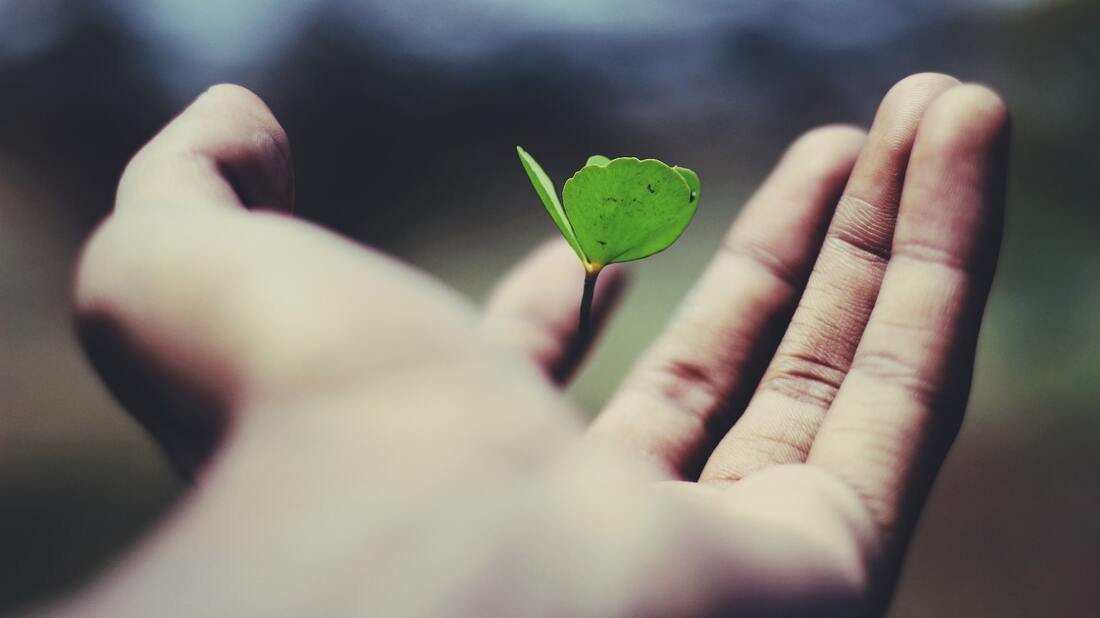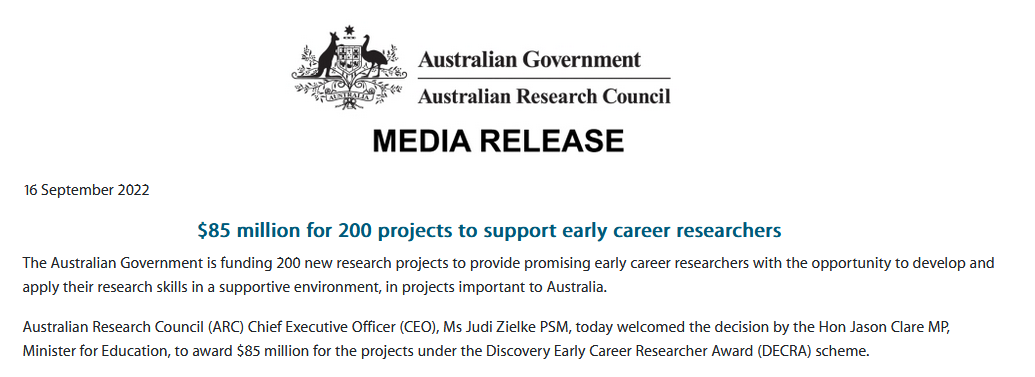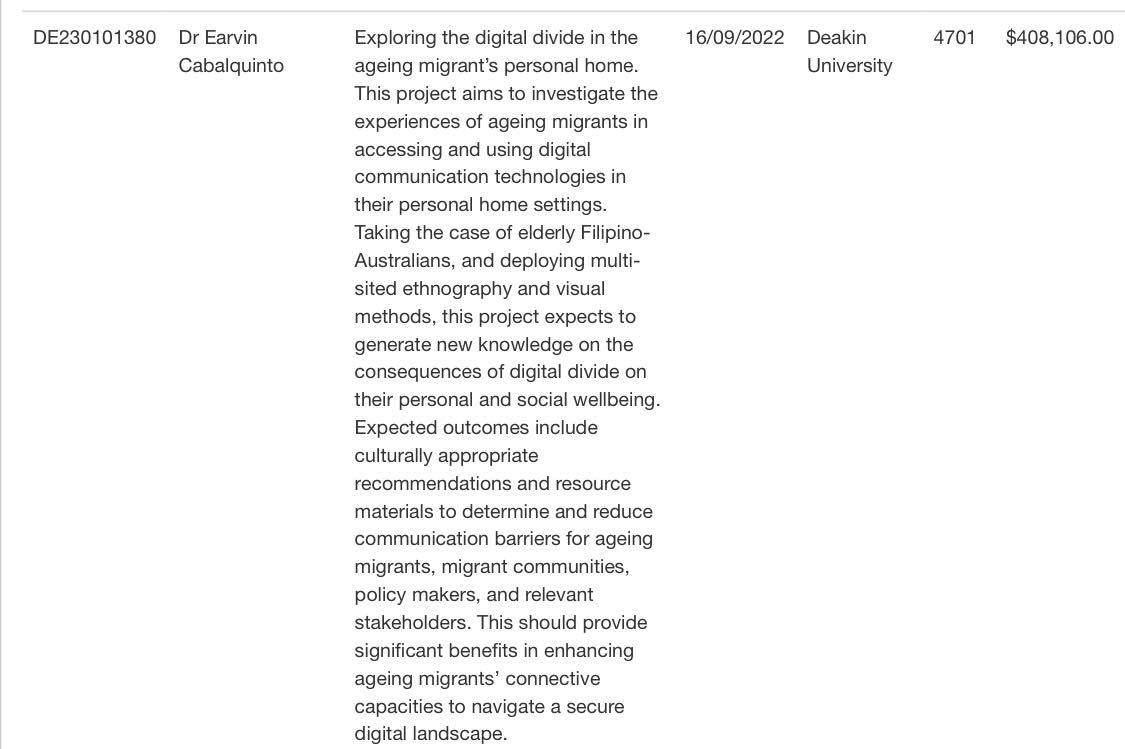|
Friday morning, I was in a meeting with my colleagues. It’s part of a two-day retreat. That morning, our Head of School joined. He was speaking when I suddenly I received a notification on Twitter. I was not keen to open it as I was listening. But I was not able to control myself, I opened Twitter. I thought, a quick glance won’t distract me. I checked Twitter and I saw a post tagging me and two others, with the words, “Wohoo! Congratulations.” I realised the tweet was a retweet of the ARC Tracker's DE23 announcement. The tweet obviously distracted me. I suddenly clicked the RMS link and keyed CTRL F. I put, "Cabal” the first five letters of my surname. My name appeared. I was shocked. I was speechless. I felt so overwhelmed. So when my colleague looked at me, she said, “Are you okay?”. I suddenly said, “I think I got a DECRA!”. Suddenly my colleagues applauded. I was just shocked, I kept on saying “I got a DECRA!” I couldn’t even cry. I also kept on apologising to the HOS because I interrupted him, but he was so kind to let me express my feelings in the room. Few minutes later, my colleagues did a celebratory toast (no alcohol as it was a meeting!). After, they asked about the project. I shared a bit of my journey and the project. Then they asked me to call someone or some people to tell the excellent news. I went out of the room, I called my partner. I was teary eyed. I also spoke to so many people, screaming on top of my lungs in the hallway. One personnel even asked me, “Are you okay?” I responded, "Yes, yes!" I started receiving congratulatory messages via email, SMS, Facebook, and more importantly on Twitter. I also called my father in the Philippines. I had to explain to him what a DECRA is. It was surreal. In fact, I was not expecting an early announcement. I was expecting an email from ARC at the end of September or in the first week of October. And for the past months, I was already setting my mind to see the word, “Unfunded”. With this in mind, I thought, I will go back to the Philippines for a vacation in October and I will use the time to heal and move on based on the DECRA outcome. Because I had this thinking, I already applied for other small grants for the past months, and they were both funded! So last Friday, I cried when I received the positive news, obviously on Twitter! My project entitled “Exploring the digital divide in the ageing migrant’s personal home” is one of the 200 projects funded by the ARC as part of the Discovery Early Career Researcher Award (DECRA) Project description: This project aims to investigate the experiences of ageing migrants in accessing and using digital communication technologies in their personal home settings. Taking the case of elderly Filipino-Australians, and deploying multi-sited ethnography and visual methods, this project expects to generate new knowledge on the consequences of digital divide on their personal and social wellbeing. Expected outcomes include culturally appropriate recommendations and resource materials to determine and reduce communication barriers for ageing migrants, migrant communities, policy makers, and relevant stakeholders. This should provide significant benefits in enhancing ageing migrants’ connective capacities to navigate a secure digital landscape. As much as I’m celebrating, I also want to extend my commiserations to those who missed out. Developing and submitting a grant is time consuming and exhausting. I still remember, I started my project idea in 2019 when an older Filipino-Australian said to me, “Earvin, you’re doing research on digital media. Help us. We’re struggling with this (referring to a smartphone).” From that day on, I pivot my energy on thinking about and working on how I can utilise research to better support an elderly migrant. For the past years, I completed a proposal for DE2021 and DE2022. But I didn’t submit those proposals. They remained drafts in my computer. Then I started a pilot project in 2020, the start of the pandemic when the ‘digital home’ became a central space of (dis)comfort for many people across the world. People were physically stuck at home but virtually mobile (if one has access, skills, and networks). As I developed my project, it was in 2022 when I decided to proceed with my DECRA 2023 application. I took the one-year automatic eligibility extension. While I was caring from afar for my father who was in and out of the hospital in the Philippines, and dealing with lockdowns in Melbourne (more than 250 days!), I was working on my proposal. I was waking up early mornings and sleeping late nights to write and work on revisions. I was also managing my teaching and university service duties! Overall, while my DECRA application is my first and my last, I had two DECRA proposals that I didn’t submit. They were part of the drawing board on grant writing. But I learned a lot through the process. With an understanding of the grant application, I am hoping that change can happen to better support especially many brilliant scholars in precarious employment.  Photo by name_ gravity on Unsplash I am writing this blog to express my deepest gratitude to those people who supported my grant writing journey. I would like to thank the assessors for supporting the project. I am immensely thankful for the positive reviews of my proposal. I am extremely grateful for the support of Professor Lenore Manderson, Dr. Akane Kanai, Professor Kath Albury, Professor Nicole Curato, Professor Anita Harris, and my former PhD Supervisor, Professor Brett Hutchins. I also appreciate the encouragement of Associate Professor Emily Potter, Professor Ann Vickery, Professor Andrew Singleton, and Professor Kristy Hess. I am grateful to the workshops facilitated by Professor Andrea Witcomb and Professor Emma Kowal. Thank you goes to Professor Fethi Mansouri, the Director of the Alfred Deakin Institute, the Alfred Deakin Institute for Citizenship and Globalisation, and the Faculty of Arts and Education at Deakin University for supporting my application. Thank you to the staff in the Research Office for the assistance too. I appreciate the encouragement and emotional support from Dr Natalie Hendry, Dr Ben Hanckel (another successful DECRA2023 recipient!), Dr Marianne Sison, Dr Laura Rodriguez Castro, Dr Annisa Beta (another successful DECRA2023 recipient!) Dr Alexia Maddox, Dr James Meese, Dr Brady Robards, Dr Charisma Ratnam, Dr Kate Mannel, Dr Indigo Holcombe-James, Dr Cesar Albarran-Torres, Dr Andy Zhao, Dr Sylvia Ang, Dr Luke Heemsbergen, Dr Maria Tanyag, Dr Thomas Baudinette, Dr Aim Sinpeng, Professor Cheryll Soriano, Dr Koen Leurs, Dr Monika Winarnita, Associate Professor Narelle Warren, and Dr Jian Xu. I also thank the various research institutions that have been supporting my scholarly journey, including the Humanities Research Council at the Australian National University, Centre for Mobilities Research (CeMoRe) at Lancaster University (United Kingdom), and the Centre of Excellence in Research on Ageing and Care (CoE AgeCare), University of Jyväskylä (Finland). I also extend my sincerest gratitude to the migrant communities and stakeholders who supported my pilot project, including the Australian Filipino Community Services, Federation of Ethnic Communities' Council of Australia (FECCA) and the Ethnic Communities’ Council of Victoria (ECCV), and many more. I am grateful to my friends too who provided laughter especially during tough times! The chit chats over dinner and coffee catch ups were helpful. My family and friends in the Philippines were also supportive. The Zoom sessions and fun chats in a messaging application were therapeutic. More importantly, I thank my partner for his kindness, generosity, and support when I was developing the proposal. He has been my rock in this journey! I can’t wait to work on this massive and life-changing opportunity. It will not only help and develop collaborations with ageing migrants, their networks, and diverse communities and stakeholders to foster a secure digital future. It will also advance the field of digital media, mobilities, migration, and ageing. I am also looking forward to sharing my knowledge and approaches on grant application down the track. This is on top of mentoring scholars who are interested in the intersections of digital media, migration, and ageing research. Do join the Digital Migration Network - @Migration_D - to know more about research on the intersections of digital media and migration. I am convening this group. In my language I say, maraming salamat!
0 Comments
Leave a Reply. |
|


